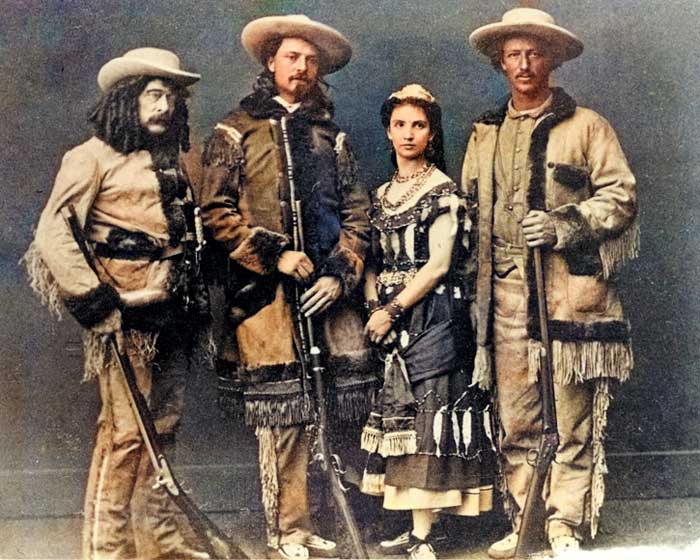
Principals in Scouts of the Prairie, the “peerless Morlacchi” looking rather diminutive between the two strapping plainsmen. Left to Right: Ned Buntline, Buffalo Bill, Giuseppina Morlacchi, Texas Jack.
By Daniel R. Seligman
Scouts of the Prairie opened on December 16, 1872 in Nixon’s Amphitheatre in Chicago, a little over a year after the Great Chicago Fire. The play featured plainsmen Buffalo Bill Cody and Texas Jack Omohundro playing themselves, scriptwriter Ned Buntline as a trapper, and dancer and actress Giuseppina Morlacchi as an Indian maiden. The script was apparently adapted by Ned Buntline from a dime novel written by Ned Buntline. To put it mildly, it was not a critical tour de force. According to the Chicago Times:
“On the whole it is not probable that Chicago will ever look upon the like again. Such a combination of incongruous drama, execrable acting, renowned performers, mixed audience, intolerable stench, scalping, blood and thunder is not likely to be vouchsafed to a city for a second time – even Chicago.”
Scouts of the Prairie may not have delighted the critics but it was a rousing financial success. Artistic merit be damned, the audience was thrilled to view the likes of famous plainsmen Buffalo Bill and Texas Jack and the accomplished and attractive Giuseppina Morlacchi. The show proceeded to tour other major American cities where it was likewise received with enthusiasm in spite of its artistic limitations.
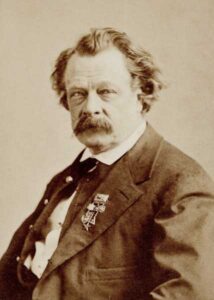
Ned Buntline
Scouts of the Prairie was the brainchild of Edward Zane Carroll Judson, a.k.a. Ned Buntline, who had a career that defies exaggeration. He was born sometime in the 1820s and went to sea as a boy. For the heroic rescue of seamen thrown overboard by a collision in New York’s East River, he was promoted to midshipman. Buntline saw naval service in the Seminole War and army service in the Civil War, avoiding the intervening Mexican War, although later claiming to have participated. He became deeply involved in political activity with the nativist Know-Nothing Party and served a year in prison for his role in a political riot in New York. During the run of Scouts of the Prairie, he was arrested in St. Louis for skipping bail 20 years earlier over his participation in another political riot. Buntline was a heavy drinker and also an eloquent temperance lecturer when he was sober… and even sometimes when he wasn’t. He logged a long series of marriages, near-marriages, liaisons, divorces and at least one bigamy charge and was once nearly hanged after winning a duel with an angry husband. Buntline had a lifelong interest in writing and strong literary pretensions and both edited and wrote for serious literary publications. However, he found it far more lucrative to write rousing historical fiction and was the author of a number of dime novels.
Buntline had some difficulty persuading a young Buffalo Bill to go on the stage. Buffalo Bill – William Frederick Cody – was a few months shy of 27 and not yet the world-famous showman of Buffalo Bill’s Wild West. However, he was well known to the audience, having developed a national reputation as a buffalo hunter, guide and scout for the army, his fame augmented by Buntline’s popular dime novels. Cody had already had an experience with stage fright. Earlier the same year, he traveled east at the invitation of James Gordon Bennett, publisher of the New York Herald, for whom he had served as guide on a buffalo hunt. Cody was present on the opening night at the Bowery Theatre of the drama Buffalo Bill, the King of Border Men, by Fred G. Maeder, based on a dime novel by none other than Ned Buntline. When the audience learned that the real Buffalo Bill was in the house, he was called on to make a reluctant speech. In his own words:
“I made a desperate effort, and a few words escaped me, but what they were I could not for the life of me tell, nor could any one else in the house.”
But Buntline was persistent and Cody eventually succumbed to an appeal to his pocketbook and perhaps his vanity:
“There’s money in it…and you will prove a big card, as your character is a novelty on the stage.”
Texas Jack – John Baker Omohundro – had a background similar to Buffalo Bill’s. While he never achieved the same lifetime renown, he was in 1872 a well-regarded plainsman and, like Buffalo Bill, a dime novel hero. Born in Virginia in 1846, he went west to Texas as an adolescent but returned when the Civil War broke out, serving the Virginia militia as a courier and managing to enlist in the 5th Virginia Cavalry in 1864 when he was 18 or nearly so. After the war’s end, he returned to Texas and the burgeoning cattle business where he drove cattle and developed considerable skill with horse, gun and lariat. According to one newspaper, he led a cattle drive to a town in Tennessee to relieve a meat shortage, where he was dubbed “Texas Jack” by grateful recipients in spite of his Virginia origins. Texas Jack spent some time in Kansas and Nebraska where he made a name for himself as a guide, hunter and scout for the army, and the acquaintance of scouts California Joe Milner, Wild Bill Hickok and Buffalo Bill Cody. When Cody agreed to go on stage with Ned Buntline, Texas Jack accompanied him.
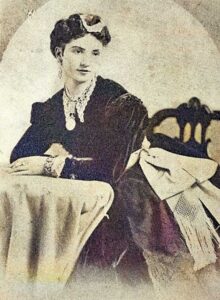
Actress Giuseppina Morlacchi, 1872
Giuseppina Morlacchi was born in 1846 in Milan, Italy, and trained from age 6 as a dancer. She developed a considerable reputation on the continent and in England and debuted in America in 1867, where she appeared to rave reviews in a number of eastern cities as a dancer and actress and formed her own company, the Morlacchi Ballet Troupe. Known as “the peerless Morlacchi,” she is credited with introducing the cancan to America at the Theatre Comique in Boston. It is hard to fathom why such an accomplished artiste would consent to appear in such an unlikely vehicle for her talents as Scouts of the Prairie. Perhaps it was a tribute to the persuasiveness of Ned Buntline or the promise of remuneration. But there might have been a third reason: she and Texas Jack fell in love and married the following year.
Even before its first performance, Scouts of the Prairie had its share of mishaps. Jim Nixon backed out as a partner when he realized on Thursday that the show opened the following Monday and Buntline had yet to write the script and obtain a company, not least the ”ten Sioux and Pawnee chiefs” promised in a newspaper advertisement. Buntline had to rent the amphitheater from Nixon for $600, half in advance and obtain the company from whatever local talent could be hastily assembled.
According to Cody, Buntline wrote the play in four hours, using Sherman House hotel clerks as assistants. There wasn’t a lot of time for Buffalo Bill and Texas Jack to learn their parts…and they didn’t. Cody choked on his lines at the outset, had to be prompted by Buntline and wound up clumsily adlibbing his way through the performance. But his artlessness and inexperience just didn’t matter and he was interrupted by frequent applause from the audience.
The script has not survived, which is probably no great loss. We can get a rough idea of the plot from a synopsis in a surviving program from a Boston performance on March 5, 1873, although, admittedly, there is no guarantee that what was printed in the program is what transpired on the stage. The play seems to resemble a mid-20th century B western, with a large dose of Victorian sentimentality and the heavy influence of the temperance movement of the late 19th century. It features evil white renegades, captives requiring rescue, Indians who are both treacherous foes and sympathetic victims of firewater, a dramatic death scene and subsequent vengeance, a Scalp Dance, a knife fight, a polygamous Mormon and a German trader, a sentimental lament over a dead lover, more than its share of flying bullets and dying Indians….and a temperance lecture by Ned Buntline.
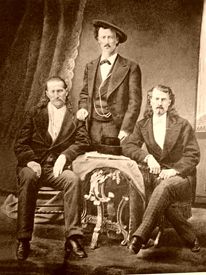
“Wild Bill” Hickok, Texas Jack Omohundro, and Buffalo Bill
The following season the troupe, organized as the Buffalo Bill Combination, parted company with Buntline for reasons unknown and took on Wild Bill Hickok, a friend of Cody’s and Texas Jack’s with a reputation likely to draw an audience. They performed a play of the same genre entitled Scouts of the Plains by Fred G. Maeder as well as Cody’s old nemesis Buffalo Bill, the King of Border Men. Unfortunately, Hickok was ill-suited to a dramatic career. His on-stage transgressions included refusing to continue until cold tea used as a prop for whiskey was replaced with the genuine article, complaining loudly about an irritating spotlight, and amusing himself by shooting too close to the legs of the actors playing Indians and leaving powder burns. Off stage, he assaulted a taxi driver in New York for overcharging him – Cody had to bail him out of jail–and brawled with local toughs in Titusville, Pennsylvania. Finally everybody, Hickok included, had had enough and Hickok left the troupe with severance pay, apparently remaining on amicable terms with Cody and Texas Jack.
For the next few years Cody pursued a dual career of part-time plainsman and part-time thespian, dividing his time between hunting and scouting activities on the plains – including a dramatic one-on-one fight to the death with Cheyenne warrior Yellow Hair—and his nascent career on stage. He also did some writing, including dime novels and an autobiography, although much of his work appears to have been ghostwritten. Cody organized Buffalo Bill’s Wild West in 1883, supposedly inspired by a gala Fourth of July celebration the preceding year in his hometown of North Platte, Nebraska.
Texas Jack and Giuseppina Morelacchi were married in Rochester, New York, on August 31, 1873. Subsequently, Jack followed a career path not unlike Cody’s, spending his time as a plainsman when he wasn’t on the stage and, additionally, writing for the Spirit of the Times magazine and the New York Herald. He appears to have parted company with Cody in 1877 and formed his own theatre combination along similar lines to Buffalo Bill’s. Giuseppina, for her part, continued with her own theatre activities. But their remaining time was short. Texas Jack died of pneumonia in Leadville, Colorado, in 1880 a month shy of his 34th birthday. Giuseppina lived another six years, dying of cancer at her summer home in East Billerica, Massachusetts at age 39.
After parting with the Buffalo Bill Combination, Buntline returned to his home in Stamford, New York, made a couple of unsuccessful attempts at his own traveling show business, engaged in various political and civic activities and continued writing. He died in 1886 of heart disease.
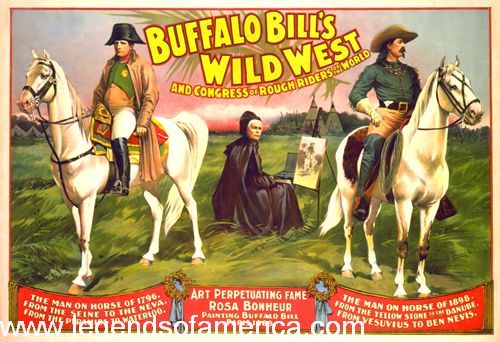
Buffalo Bill’s Wild West, Courier Litho. Co, 1899
For all its limitations, it is hard to exaggerate the historical significance of Scouts of the Prairie. It was not the first dime novel to be adapted to the stage, but it boasted two famous plainsmen playing themselves to an adoring audience, a première danseuse, and the genius of a roguish hack writer to realize its possibilities. Scouts of the Prairie played a pivotal role in the development of Buffalo Bill’s career, furthering his reputation and equipping him with the experience and confidence to form the Buffalo Bill Combination. From this it was but a short step to Buffalo Bill’s Wild West which brought the American West into the lives of countless patrons in America and Europe and launched the careers of such luminaries as Annie Oakley and Pawnee Bill. Of perhaps greater significance was its role in the genesis of the great American Western. Scouts of the Prairie was a critical step in the artistic transition from dime novel to stage and from stage to celluloid, a transition that culminated three decades later in the release of The Great Train Robbery and the beginnings of the motion picture industry.
Quite a tribute to a hastily prepared amateurish performance on a December night in a young Chicago just recovering from a devastating fire.
©Daniel R. Seligman, for Legends Of America, submitted November 2022.

Author Daniel R. Seligman
About the Author: Daniel is a retired computer engineer from Massachusetts with a lifelong interest in the American West. He teaches seminars on western gunslingers and has authored a number of articles on western history in various publications, including:
Going for Gold: How the Confederacy Hatched an Audacious Plan to Finance Their War, America’s Civil War, July 28, 2022
Tracking the White Apache, Wild West, October 2021, 44-49
King of the Tulares, Wild West, April 2021, 58-63
Annie Oakley’s Gaffe…Or Was It?, Wild West History Association Journal, September 2019, 69-73
Rough and Ready, Wild West, October 2019, 44-49
Bound and Determined, Wild West, August 2018, 46-51
This Scout Lived with the Enemy, Wild West, August 2018, 22-23
Western Stagecoach Robberies: A Statistical Analysis, Wild West History Association Journal, December 2017, 23-27
Evolution of a Mountain Man, Wild West, October 2017, 58-63
The Greatest of Confidence Men, True West, June 2015, 40-41
The Flawed Gentleman Bandit, True West, December 2013, 32-35
Frank Butler, Much Maligned Husband, True West, March 2013, 44
Sources:
William F. Cody, The Life of Hon. William F. Cody, Known as Buffalo Bill, The Famous Hunter, Scout and Guide, An Autobiography, 1879
Herschel C. Logan, Buckskin and Satin, The Life of Texas Jack and his Wife Mlle. Morlacci, 1954
Jay Monaghan, The Great Rascal, The Life and Adventures of Ned Buntline, 1952
Joseph G. Rosa, They Called Him Wild Bill, 1974
Don Russell, The Lives and Legends of Buffalo Bill, University of Oklahoma Press, 1960
More by Daniel Seligman:
Mary Jane Simpson – The Lady and the Mule
Charles Waggoner – Colorado Robin Hood
Also See:
Buffalo Bill Cody – Frontiersman & Entertainer
John Baker “Texas Jack” Omohundro – Cowboy Performer
Famous Female Shooters of the Wild West
Jack Langrishe – Entertaining the Old Wild West
